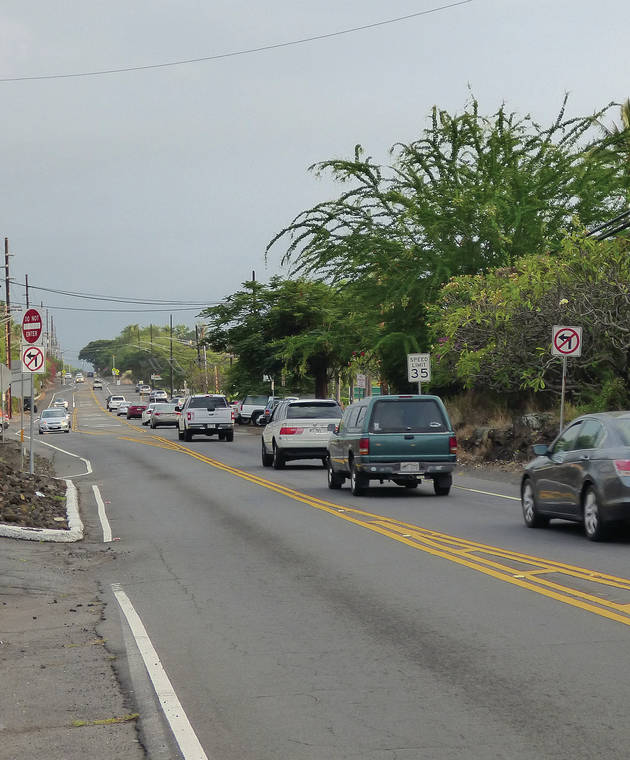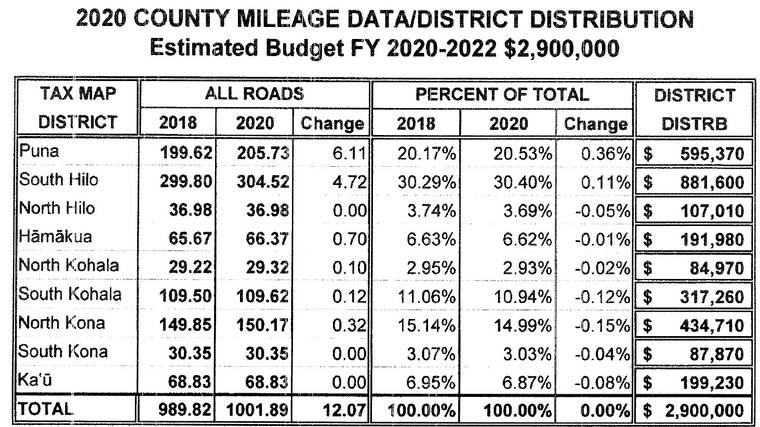Hawaii Island motorists just weren’t heeding the call of the open road much last year.
In all, drivers used about 18% less gasoline during a pandemic year that translated to fewer commutes and fewer tourists. It also translated to less money for road repair.
Gas consumption was tallied at 63.6 million gallons for the first 11 months of 2020, the most current numbers available as recorded by the state Department of Taxation. That compares to 77.5 million gallons during the same time period in 2019, prior to the coronavirus pandemic.
“In general, overall fuel volume is down,” Finance Director Deanna Sako said Thursday in an email exchange. “The amounts for FY21 have been coming in higher than we projected, but are still down compared to FY20 usage. I think primarily due to less fuel being used by visitors and less trips by employees driving to work.”
Less travel translates to less money in the county’s highway fund, but so far, the county’s been able to keep its road-repair schedule on track, said Public Works Director Ikaika Rodenhurst. The repair money — $2.9 million this year — is allocated to districts based on their percentage of local roads.
Hawaii County officials expect the highway fund, which is funded by county fuel taxes, to take a $5.3 million hit in the fiscal year that ends June 30. That’s despite a three-year series of tax hikes bringing the tax to 23 cents per gallon, tying with Maui for the highest local fuel tax surcharge in the state.
“So for the first five months of the fiscal year (July to November), volume is down by 6.6 million gallons or $1.5 million dollars,” Sako said.
Money is still coming in, and the County Council Finance Committee on Wednesday is scheduled to approve three spending measures related to its receipt.
Bill 14 appropriates money for specific projects. In addition to the $2.9 million for road repairs, engineering for specific roadway projects will account for $1.7 million and bridge inspection, repair and replacement will take another $1.2 million of the $5.8 million anticipated.
Specific road repair projects are Alii Highway, Kalanianaole Avenue, Kawili Street shoulder improvements. Kinoole Avenue improvements, Kinoole Avenue rehabilitation, Kuakini Highway widening (Hualalai to Hawaii Belt Road), Manono Street improvements, Old Mamalahoa Highway rehabilitation, Oneo Lane and Waianuenue Avenue improvements.
Bill 15 allocates an extra $91,400 that came in over expectations for the 2018-2020 biennium. Bill 13 re-appropriates $10,546 that lapsed from prior years.
The County Council in 2017 raised the county fuel tax from 8.8 cents per gallon to 15 cents, with an additional 4-cent increase in 2018 and another 4-cent hike in July 1, 2019, bringing the total to 23 cents per gallon. The local tax is on top of 16 cents per gallon state tax and 18 cents a gallon federal tax.
The 2017 council measure establishing the fuel tax made the increase contingent on “the timely submission of a comprehensive plan by the Department of Public Works in collaboration with the Office of the Mayor providing the following minimum information: amount to be generated by increases; information on how money will be distributed to all districts; transportation projects to be funded in each district; and time-lines for projects utilizing fuel tax revenues.”


